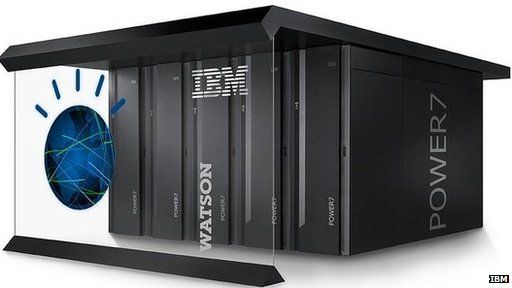IBM's supercomputer Watson to help fight brain cancer
- Published

IBM supercomputer Watson is to help determine the best treatments for a common type of brain cancer.
Watson will analyse glioblastoma patients' DNA and correlate the results with available relevant medical data.
New York Genome Center president Robert Darnell said tremendous progress had been made in understanding the genetic drivers of cancer in the past 10 years.
And the project would "improve outcomes for patients with deadly diseases by providing personalised treatment".
IBM Research director John E Kelly said: "It's like big data on steroids.
"Watson can do in seconds what would take people years. And we can get it down to a really personal level.
"This is the proverbial needle in the haystack and the haystack is enormous."
Watson uses artificial intelligence to examine huge amounts of data and can also understand human language. Rather than being programmed to spot patterns it "learns" about connections between different types of data. It is hoped that it will continue to "learn" as it processes new patient information and new medical research.
IBM Global Technology and Analytics vice-president Stephen Harvey said: "What we're really talking about is taking a process that takes three weeks to three months for research organisations to complete today and to boil that down, using Watson technology, in to less than three minutes."
Watson is already being used by doctors and nurses at the Memorial Sloan-Kettering Cancer Center, in New York, to help make decisions about lung cancer treatment.
Watson has become smaller and faster over the years. What started as a system the size of an average bedroom is now the size of three stacked pizza boxes. It is also available via the cloud, meaning it can be accessed from anywhere.
It can process 500GB of information - equivalent to a million books - every second.
And it has proved its abilities. In 2011 it appeared on the Jeopardy game show answering general knowledge questions, without being connected to the internet.
Pitted against the two biggest winners of the trivia quiz show, despite a few stumbles it eventually walked away with the $1m (£605,000) prize.
- Published27 February 2014
- Published9 January 2014
- Published7 March 2014